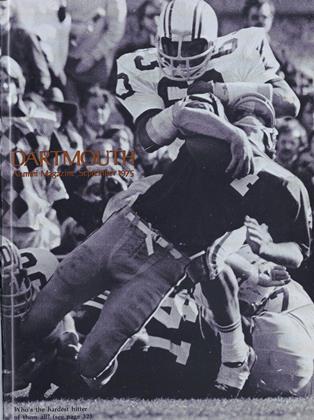Tenure decisions are, under the best ofconditions, a trying and embarrassing affair; the present situation in the HistoryDepartment guarantees that it will also becruel and tragic. ... All in all it is an uglypredicament, one which no one seems tolike dealing with.
Dartmouth Course Guide, 1974
Though writing about another recent case at Dartmouth, the Course Guide commentator, a student, aptly described the matter of Jonathan Mirsky, teacher of history and Asian Studies for nine years, now departed. It has been an ugly predicament, one which no one liked dealing with.
Professor Mirsky was an anomaly at Dartmouth - an Ivy Leaguer (B.A. and M.A. from Columbia; Ph.D. from Penn) who was anything but button-down; a frequent critic of Dartmouth who made an annual contribution to the Alumni Fund; a popular figure who rankled. Many Mirsky defenders say he was martyred, a victim of academic policy-makers. Others insist that he was fairly judged and that if he was caught in the grinding wheels of the tenure system he had himself to blame. Very likely, as was reported in the May ALUMNI MAGAZINE, it was something in between.
Mirsky was hired as an assistant professor in 1966 to teach Chinese. But Chinese was not then a department or major program, and it became increasingly unclear as -to where authority rested for contract renewals. Such decisions are usually made by tenured professors in a given department. So, according to one member of the faculty, the History Department became involved "to bail out everybody in what began to be a bureaucratic morass." In 1970 the History Department recommended to the Committee Advisory to the President, an eight- member faculty committee that passes on tenure decisions, that Mirsky be reappointed at the associate professor level with a five-year contract. The recommendation was made in consideration that Mirsky was philosophically opposed to tenure and would refuse it if offered. The CAP in turn approved a four-year appointment with a tenure decision to be made in the third year.
But after fashioning this compromise the History Department found itself in a quandary of its own devise. The senior members of the department wanted their own Far Eastern expert - they already had one - while Mirsky's half-time appointment in History effectively made him the Far Eastern expert. There was also some grumbling that Mirsky's publications were actually "journalism based on scholarship rather than scholarly writings."
In 1973, when the Mirsky contract came up for review again, the History Department and an ad hoc tenure committee both recommended him for tenure - or for a five-year renewable contract if he still refused tenure - but History and the adhoc committee let it be known that it shouldn't be a dual appointment as before. It should only be in Asian Studies, which was on shaky ground itself.
The CAP, for its part, approved renewal of the contract at the associate professor level but only for two years - with a tenure decision to come in the second year. Mirsky had hoped for a continuation of the dual appointment - his Ph.D. had been taken in history - but this turned out not to make much difference as the appointment of merely two years struck him as an intolerable insult. Some of his friends argued that he should accept anyway, thereby gaining more time to fight the battle. But ultimately he wrote a letter of resignation, which was rejected by one of the deans on the basis that Mirsky technically couldn't resign from what he didn't have any more.
Mirsky then departed for a sabbatical year in England, with one option still open. It developed that the East Asian Studies Center could, if it wanted, grant a half- tenure appointment to him. But perhaps by now, with charges of duplicity and intransigence filling the air, the matter had become too trying, too embarrassing, too cruel. The East Asian Studies Center took no action on the proposal.
"Responsibility for these distasteful affairs," said the Course Guide, "is difficult to pinpoint. ... From a student's point of view, to be sure, it matters very little who is responsible or why it happened that an inspiring teacher was lost. The overwhelming fact is that he ... is no longer available."
 View Full Issue
View Full Issue
More From This Issue
-
 Feature
FeatureThe First 25 Years of the Dartmouth Bequest and Estate planning Program
September 1975 By Robert L. Kaiser '39 and Frank A. Logan '52 -
 Feature
FeatureThe Computer Goes Fishing
September 1975 By DARREL MANSELL -
 Feature
FeatureFive Plays for All Seasons
September 1975 By DREW TALLMAN and JACK DeGANGE -
 Feature
FeatureAlumni Fund Chairman's Report
September 1975 -
 Feature
FeatureAn Irresistible Force?
September 1975 -
 Feature
FeatureReport of the Office of Development
September 1975








